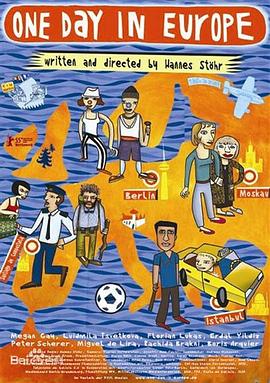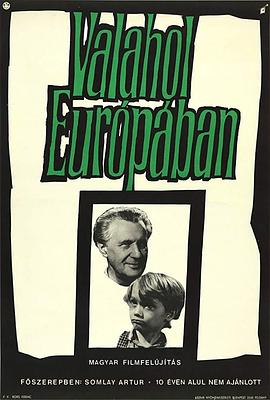Somewhere in the remote region, the war ends. In the midst of ruined cities and houses in the streets, in rural hamlets, everywhere where people still live, are children who have lost their homes and parents. Abandoned, hungry, and in rags, defenseless and humiliated, they wander through the world. Hunger drives them. Little streams of orphans merge into a river which rushes forward and submerges everything in its path. The children do not know any feeling; they know only the world of their enemies. They fight, steal, struggle for a mouthful of food, and violence is merely a means to get it. A gang led by Cahoun finds a refuge in an abandoned castle and encounters an old composer who has voluntarily retired into solitude from a world of hatred, treason, and crime. How can they find a common ground, how can they become mutual friends The castle becomes their hiding place but possibly it will also be their first home which they may organize and must defend. But even for this, the price will be very high. To this simple story, the journalist, writer, poet, scriptwriter, movie director, and film theoretician Béla Balázs applied many years of experience. He and the director Géza Radványi created a work which opened a new postwar chapter in Hungarian film. Surprisingly, this film has not lost any of its impact over the years, especially on a profound philosophical level. That is to say, it is not merely a movie about war; it is not important in what location and in what period of time it takes place. It is a story outside of time about the joyless fate of children who pay dearly for the cruel war games of adults. At the time it was premiered, the movie was enthusiastically received by the critics. The main roles were taken by streetwise boys of a children's group who created their roles improvisationally in close contact with a few professional actors, and in the children's acting their own fresh experience of war's turmoil appears to be reflected. At the same time, their performance fits admirably into the mosaic of a very complex movie language. Balázs's influence revealed itself, above all, in the introductory sequences an air raid on an amusement park, seen in a montage of dramatic situations evoking the last spasms of war, where, undoubtedly, we discern the influence of classical Soviet cinematography. Shooting, the boy's escape, the locomotive's wheels, the shadows of soldiers with submachine guns, the sound of a whistle—the images are linked together in abrupt sequences in which varying shots and expressive sharp sounds are emphasized. A perfectly planned screenplay avoided all elements of sentimentality, time-worn stereotypes of wronged children, romanticism and cheap simplification. The authors succeeded in bridging the perilous dramatic abyss of the metamorphosis of a children's community. Their telling of the story (the scene of pillaging, the assault on the castle, etc) independently introduced some neorealist elements which, at that time, were being propagated in Italy by De Sica, Rossellini, and other film artists. The rebukes of contemporary critics, who called attention to formalism for its own sake have been forgotten. The masterly art of cameraman Barnabás Hegyi gives vitality to the poetic images. His angle shots of the children, his composition of scenes in the castle interior, are a living document of the times, and underline the atmosphere and the characters of the protagonists. The success of the picture was also enhanced by the musical art of composer Dénes Buday who, in tense situations, inserted the theme of the Marseilaise into the movie's structure, as a motive of community unification, as an expression of friendship and the possibility of understanding. Valahol Europaban is the first significant postwar Hungarian film. It originated in a relaxed atmosphere, replete with joy and euphoria, and it includes these elements in order to demonstrate the strength of humanism, tolerance, and friendship. It represents a general condemnation of war anywhere in the world, in any form.
关联推荐
猜你喜欢
 6.1
全40集
白鹿 敖瑞鹏 代露娃 常华森 韩栋 代斯 汤镇业 李彧 夏铭浩 刘令姿 梁雪峰 张鑫 程涛 程泓鑫 全伊伦 潘珺雅
凡人少女白烁(白鹿 饰)自小寻仙问道,在意外结识极域妖王梵樾(敖瑞鹏 饰)后,二人共同踏上开启上古神物无念石之路,为集齐“爱恨杀贪善”五念,在宁安城、异人城、静幽山、石城、菩提村经历了种种考验,二人一
6.1
全40集
白鹿 敖瑞鹏 代露娃 常华森 韩栋 代斯 汤镇业 李彧 夏铭浩 刘令姿 梁雪峰 张鑫 程涛 程泓鑫 全伊伦 潘珺雅
凡人少女白烁(白鹿 饰)自小寻仙问道,在意外结识极域妖王梵樾(敖瑞鹏 饰)后,二人共同踏上开启上古神物无念石之路,为集齐“爱恨杀贪善”五念,在宁安城、异人城、静幽山、石城、菩提村经历了种种考验,二人一
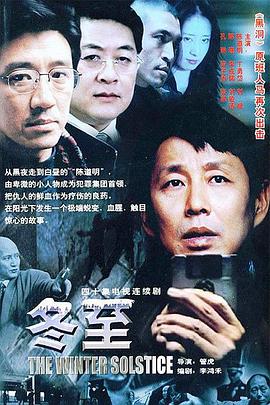 6.4
已完结
陈道明 陈瑾 丁勇岱 张子健 刘斌 高景文 李诚儒 刘敏涛 冯国强 杜玉明 公磊 孔琳 柴鸥 伊春德 阎青妤 陶飞霏 段宇华 李婷 曹力 钱志 毛源 胡龙吟 马捷 王伟光
冬至银止司帐陈一仄(陈讲明 饰)与刑警蒋热(丁怯岱 饰)可谓风马牛没有相干的两个职业,由于一同库款匪匪案将两人的运气联系正在了一同。警圆介进后,陈一仄主动协助调査,没有暂薛非(李成儒 饰)进进警圆视野
6.4
已完结
陈道明 陈瑾 丁勇岱 张子健 刘斌 高景文 李诚儒 刘敏涛 冯国强 杜玉明 公磊 孔琳 柴鸥 伊春德 阎青妤 陶飞霏 段宇华 李婷 曹力 钱志 毛源 胡龙吟 马捷 王伟光
冬至银止司帐陈一仄(陈讲明 饰)与刑警蒋热(丁怯岱 饰)可谓风马牛没有相干的两个职业,由于一同库款匪匪案将两人的运气联系正在了一同。警圆介进后,陈一仄主动协助调査,没有暂薛非(李成儒 饰)进进警圆视野
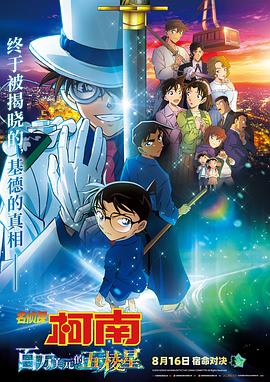 8.2
高清
高山南 山崎和佳奈 小山力也 山口胜平 堀川亮 宫村优子 大泉洋 绪方贤一 岩居由希子 高木涉 大谷育江 林原惠美 石井康嗣
2024年剧场版制作决定:怪盗基德和服部平次登场!舞台为北海道函馆! 2024年的主角是 —— 怪盗基德 VS 服部平次!!!
8.2
高清
高山南 山崎和佳奈 小山力也 山口胜平 堀川亮 宫村优子 大泉洋 绪方贤一 岩居由希子 高木涉 大谷育江 林原惠美 石井康嗣
2024年剧场版制作决定:怪盗基德和服部平次登场!舞台为北海道函馆! 2024年的主角是 —— 怪盗基德 VS 服部平次!!!
 8.0
第24集完结
田鸿杰 季美含 陈康 郑丞丞 尹蕊 叶啸秋 胡浩帆 陈稳 刘帆昕 王逸嘉 冯建宇 许馨文 柏智杰 臧一人
该剧改编自畅销书作家文吉儿的小说《春风习习人间谣》,《一起长大的约定》为该书的重点篇章
8.0
第24集完结
田鸿杰 季美含 陈康 郑丞丞 尹蕊 叶啸秋 胡浩帆 陈稳 刘帆昕 王逸嘉 冯建宇 许馨文 柏智杰 臧一人
该剧改编自畅销书作家文吉儿的小说《春风习习人间谣》,《一起长大的约定》为该书的重点篇章
 8.0
更新至20241130期
苑琼丹 刘维 方家翊 李菲儿 孟佳 冉高鸣 伍嘉成 王瀚哲
节驲将约请7位明星主理人,联足各具特征的主播开资人经由历程3场直播年夜考,终究选出1个年度光枯团队、3名年度光枯主播,失失落百亿流量扶持。
8.0
更新至20241130期
苑琼丹 刘维 方家翊 李菲儿 孟佳 冉高鸣 伍嘉成 王瀚哲
节驲将约请7位明星主理人,联足各具特征的主播开资人经由历程3场直播年夜考,终究选出1个年度光枯团队、3名年度光枯主播,失失落百亿流量扶持。
 9.1
正片
汤姆·哈迪 切瓦特·埃加福 朱诺·坦普尔 斯蒂芬·格拉汉姆 瑞斯·伊凡斯 佩吉·陆 安迪·瑟金斯 克拉克·巴茨科 阿兰娜·乌巴赫 克里斯托·费尔南德斯 哈拉·芬利 达什·麦克劳德 布鲁克·卡特 伊沃·南迪 奥蒂斯·温斯顿
毒液和埃迪(汤姆·哈迪 Tom Hardy 饰)迎来至暗时刻。一边是人类神秘组织的穷追猛打,一边是外星共生体大军入侵地球,他们一心同体,花式解锁海陆空作战新形态。面对两边的疯狂追捕,这对亡命搭档将被迫
9.1
正片
汤姆·哈迪 切瓦特·埃加福 朱诺·坦普尔 斯蒂芬·格拉汉姆 瑞斯·伊凡斯 佩吉·陆 安迪·瑟金斯 克拉克·巴茨科 阿兰娜·乌巴赫 克里斯托·费尔南德斯 哈拉·芬利 达什·麦克劳德 布鲁克·卡特 伊沃·南迪 奥蒂斯·温斯顿
毒液和埃迪(汤姆·哈迪 Tom Hardy 饰)迎来至暗时刻。一边是人类神秘组织的穷追猛打,一边是外星共生体大军入侵地球,他们一心同体,花式解锁海陆空作战新形态。面对两边的疯狂追捕,这对亡命搭档将被迫
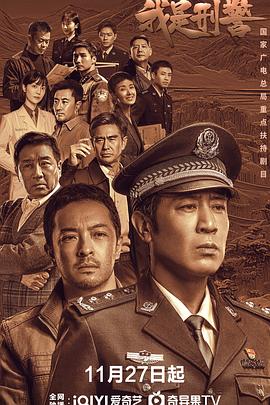 7.3
第38集完结
于和伟 富大龙 丁勇岱 白凡 马苏 黄曼 刘凯 赵阳 李溪芮 胡明 李泓良 孙浩 郑晓宁 颜世魁 冯国强 杜功海 李宝安 周波 邵兵 李泰 王玉宁 武笑羽 曹卫宇 赵岩松 安冬 要武 曹骏 朱辉 高海鹏 刘恩尚 石文中 刘泊霄 白威 于俭 孙玮 柳明明 孙强 李春嫒 秦旋 王茂蕾 许之糯 常荻 刘喆 王奕盛 潘宏梁 霍政谚 陈子潇 朱义 李田野 崔文静 张旭 梅洋 封新天 林一霆 党伟 刘洁 薛淑洁 薛淑杰
90年代的中昌省河昌市,基层民警秦川凭借自身努力求学深造,终于如愿成为一名刑警。在师父高建设、好友叶茂生壮烈牺牲后,秦川更加坚定了自己捍卫正义,制裁犯罪分子的决心,先后参与侦破多起案件,逐渐成长为中昌
7.3
第38集完结
于和伟 富大龙 丁勇岱 白凡 马苏 黄曼 刘凯 赵阳 李溪芮 胡明 李泓良 孙浩 郑晓宁 颜世魁 冯国强 杜功海 李宝安 周波 邵兵 李泰 王玉宁 武笑羽 曹卫宇 赵岩松 安冬 要武 曹骏 朱辉 高海鹏 刘恩尚 石文中 刘泊霄 白威 于俭 孙玮 柳明明 孙强 李春嫒 秦旋 王茂蕾 许之糯 常荻 刘喆 王奕盛 潘宏梁 霍政谚 陈子潇 朱义 李田野 崔文静 张旭 梅洋 封新天 林一霆 党伟 刘洁 薛淑洁 薛淑杰
90年代的中昌省河昌市,基层民警秦川凭借自身努力求学深造,终于如愿成为一名刑警。在师父高建设、好友叶茂生壮烈牺牲后,秦川更加坚定了自己捍卫正义,制裁犯罪分子的决心,先后参与侦破多起案件,逐渐成长为中昌
 9.4
更新至20250126期
郭艾伦 孟子义 庞博 张云龙 张予曦
一档运动少年励志成长类节目,从全国各大中高校、体育赛场上选拔出60位篮球少年,他们将在校园集结,通过集体生活,以赛代练,最终将有10人成为夏季冠军。
9.4
更新至20250126期
郭艾伦 孟子义 庞博 张云龙 张予曦
一档运动少年励志成长类节目,从全国各大中高校、体育赛场上选拔出60位篮球少年,他们将在校园集结,通过集体生活,以赛代练,最终将有10人成为夏季冠军。

